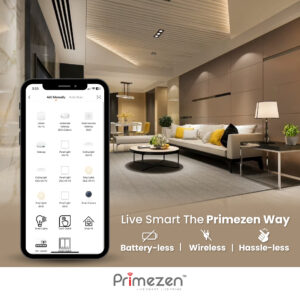In recent years, home automation has rapidly gained popularity, transforming houses into intelligent living spaces. Smart home automation involves integrating various technologies and devices to enhance your living environment’s efficiency, security, and comfort. From controlling lighting to managing security cameras and appliances, the possibilities are endless.
In this blog, we will explore the meaning of home automation, its impact on individuals’ lives, the transformative benefits of home automation, and the potential risks associated with this cutting-edge technology.
What is Smart Home Automation?
Smart home automation is the application of modern technology to automate various household tasks and processes, making them more intelligent and responsive to user preferences. It involves connecting different devices through a central hub or network. These devices can be accessed and controlled remotely via smartphones, tablets, or voice assistants like Amazon Alexa or Google Assistant. The interconnected devices communicate with each other and the user, offering unparalleled convenience and efficiency.

The range of smart devices available for home automation is diverse. This includes lighting systems, curtain controllers, security cameras, door locks, and motion sensors. The objective is to create a seamless ecosystem that simplifies daily routines and provides a more personalized living experience.
How Does Home Automation Change Your Lifestyle?
The impact of home automation on individuals’ lives is nothing short of revolutionary. By delegating mundane tasks to automated systems, homeowners can save time, reduce energy consumption, and enjoy a higher level of convenience. The integration of home automation profoundly influences one’s lifestyle, introducing new levels of comfort, flexibility, and control.
Furthermore, home automation simplifies daily routines. With the ability to control various devices through a smartphone or voice command, homeowners can adjust their living spaces to suit their preferences with minimal effort. For instance, you can dim the lights, lower the blinds, and play your favourite music, all with a simple voice command.
What are the Benefits of Home Automation in Individual Life?
Smart home automation has a transformative effect on lifestyles by introducing convenience, comfort, efficiency, and control to our daily lives. Here are some benefits of home automation:
- Enhanced Convenience: One of the most significant changes brought about by home automation is the unparalleled convenience it offers. With the ability to control various devices and systems remotely through smartphones or voice commands, homeowners can effortlessly manage their living spaces.
- Personalized Living Experience: Home automation systems can learn from your habits and preferences, adapting to your lifestyle to create a customized living experience.
- Energy Efficiency: Home automation helps optimize energy usage, leading to increased energy efficiency and reduced utility bills.
- Improved Security and Safety: Home automation significantly enhances home security and safety. Smart doorbell security kits and motion detection provide homeowners with a sense of security, allowing them to keep an eye on their property from anywhere.
- Remote Monitoring and Control: One of the most significant advantages of home automation is the ability to monitor and control your home remotely. Whether you are at work, on vacation, or anywhere in the world, you can access your smart devices through a smartphone app.
Additional advantages include increased accessibility, improved home management, easy maintenance, etc.
What are the Risks Associated with Home Automation?
While smart home automation offers numerous benefits, it is essential to consider the potential risks and disadvantages of home automation. The most common disadvantages of home automation systems include:
- Data Privacy and Security Concerns: Smart devices constantly collect and transmit data to function effectively, and this data can include sensitive information about residents’ habits, routines, and preferences. If these devices are not adequately secured, they may become vulnerable to hacking, unauthorized access, or data breaches.
- System Vulnerabilities and Malfunctions: Home automation systems rely on interconnected devices and a central hub to communicate and execute commands. If there are vulnerabilities in the software or hardware of these devices, it could lead to system malfunctions or failures.
- Dependency on Internet Connectivity: Smart home automation relies on internet connectivity to function efficiently. If there is a disruption in internet service or a power outage, it may render the automation system temporarily inaccessible.
To mitigate these risks, homeowners should take several measures, like investing in reputable brands and securing Wi-Fi networks, to ensure a safer and more reliable smart living experience.
Smart home automation has redefined modern living, empowering homeowners to create intelligent, efficient, and secure living spaces. Home automation benefits, including increased convenience, energy efficiency, and enhanced security, are significant factors that drive its widespread adoption. With proper understanding, careful implementation, and continuous improvement of security measures, home automation can continue to improve and enrich our lives for years to come.
Embrace the art of making your home smarter and experience the true magic of living in the future!



